|
|
|
Sort Order |
|
|
|
Items / Page
|
|
|
|
|
|
|
| Srl | Item |
| 1 |
ID:
167607
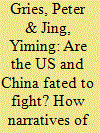

|
|
|
|
|
| Summary/Abstract |
Are the United States (US) and China destined to fall into a ‘Thucydides trap’ of power transitions leading to great power conflict? This study explores how the intersubjective perception of media-disseminated narratives of US–China interdependence may shape the likelihood of war. In two randomized online experiments, we manipulated ordinary Americans’ perceptions of US–China relations with real CNN video clips that narrated a US–China power transition as either positive or zero sum. Across both experiments, more zero-sum narratives boosted perceived US–China competition, increasing intergroup mistrust, anger and subsequent desires for a tougher China policy. The second study also revealed that individual differences in nationalism and uncertainty avoidance moderated the effects of the perception of media narratives on mistrust and anger. Viewers actively interpret media they are exposed to. These findings empirically demonstrate the power of narratives: specifically, they reveal the psychological mechanisms linking structural changes in the balance of power to the individual-level processes that may determine great power war and peace.
|
|
|
|
|
|
|
|
|
|
|
|
|
|
|
|
| 2 |
ID:
188816
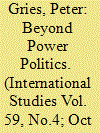

|
|
|
|
|
| Summary/Abstract |
A growing literature demonstrates that ideology shapes international relations. But just how does ideology have its effect? This article develops an integrated model of mediators and moderators of the impact of ideology on foreign policy. Specifically, it hypothesizes that ideologically motivated perceptions of threat and national power sequentially mediate the impact of individual-level ideologies on foreign policy preferences, and that in/out-group social categorization processes moderate the relationship. We interrogate these propositions with three plausibility probe case studies. The conclusion discusses which aspects of the model were best supported by the plausibility probes—and suggests hypotheses for future causal testing.
|
|
|
|
|
|
|
|
|
|
|
|
|
|
|
|
| 3 |
ID:
181394
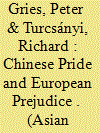

|
|
|
|
|
| Summary/Abstract |
The Chinese government’s cover-up of the origins of the new coronavirus, and its more openly prideful and aggressive foreign and human rights policies, triggered a dramatic deterioration of foreign views of China in 2020. That year also witnessed a significant increase in anti-Chinese/Asian prejudice around the world. Could the former have shaped the latter? Drawing on theories of prejudice and ideology, and using an Autumn 2020 13-nation European survey about China, this paper explores whether increasingly negative attitudes toward Chinese government policies prejudiced European views of local Chinese students, tourists, and communities. It finds substantial evidence of a spillover effect, an effect which is stronger among conservative Europeans than among progressive Europeans more motivated to avoid prejudice. The paper concludes with thoughts on the danger that China’s prideful “wolf warriors” pose for Chinese students, tourists, and local Chinese communities confronting prejudice in Europe today.
|
|
|
|
|
|
|
|
|
|
|
|
|
|
|
|
| 4 |
ID:
111169
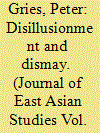

|
|
|
|
|
| Publication |
2012.
|
| Summary/Abstract |
The deterioration of Sino-South Korean relations following the attacks on the Cheonan and on Yonpyong Island in 2010 has again raised the question of Chinese intentions in the Korean peninsula. In this article, I explore Chinese netizen views of the two Koreas. Qualitative and quantitative evidence (in the form of a large-scale national Internet survey) provide convergent evidence that while Chinese netizens feel coolly toward both Koreas, they think and feel about them in very different ways. Chinese netizens appear to be profoundly disillusioned with a North Korea that refuses to adopt Chinese-style "reform and opening," which only reminds them of their poor and authoritarian past. However, recent high-profile historical and cultural disputes appear to have led to widespread Chinese dismay and even anger toward South Korea as well, which is perceived to be poaching on China's proud cultural heritage. These attitudes toward Korea are reflective of evolving Chinese understandings of what it means to be Chinese in the twenty-first century.
|
|
|
|
|
|
|
|
|
|
|
|
|
|
|
|
| 5 |
ID:
145749
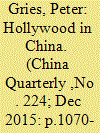

|
|
|
|
|
| Summary/Abstract |
While most mainland Chinese today have extremely few direct contacts with either America or Americans, their indirect contacts with both, via globalized American popular culture, are increasing rapidly. Do daily parasocial contacts with American celebrities shape Chinese views of America? Based on two experimental studies, this paper argues that even indirect, subconscious exposure to American celebrities via popular magazine covers shapes Chinese views of America. However, the impact of that exposure depends upon both the specific nature of the bicultural exposure and the psychological predispositions of the Chinese involved. Not all Chinese are alike, and their personality differences shape whether they experience American popular culture as enriching or threatening, leading to integrative and exclusionary reactions, respectively.
|
|
|
|
|
|
|
|
|
|
|
|
|
|
|
|
| 6 |
ID:
184755
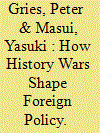

|
|
|
|
|
| Summary/Abstract |
Do history wars shape international affairs? If so, how and for whom? Taking the historical dispute between China and South Korea over the ancient Gaogouli/Goguryeo Kingdom as a case study, this article explores the individual-level psychological micro-foundations of history wars. A 2020 survey experiment in South Korea pit “ours” vs “theirs” Goguryeo imitation Wikipedia entries to explore their downstream consequences. It revealed direct, indirect, and conditional effects. Exposure to China's claim to the Kingdom undermined Korean pride, increasing dislike of China, and lessening desires to cooperate with it. Pre-existing levels of nationalism divided South Koreans in how angry they became after exposure the Wikipedia primes. That anger, however, only shaped the China policy preferences of those South Koreans who viewed the balance of military power with China favorably. Implications for ownership disputes over kimchi and other national possessions are also discussed, as are the implications of history wars for war and peace in twenty-first-century East Asia.
|
|
|
|
|
|
|
|
|
|
|
|
|
|
|
|
| 7 |
ID:
178888
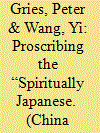

|
|
|
|
|
| Summary/Abstract |
In spring 2018 China, indignant popular nationalists demanded that the “spiritually Japanese” activities of a fringe group of young Chinese who figure themselves as Japanese be proscribed. The National People's Congress quickly complied, passing legislation that made it illegal to “beautify the war of invasion.” Exploring how and why the Chinese Communist Party (CCP) responded to the demands of popular nationalists, we suggest that authoritarian representation occurs in China even beyond the bounds of everyday apolitical issues like education and healthcare. Indeed, because the CCP relies upon a nationalist claim to legitimate rule, authoritarian legislators may respond to the public on politically sensitive issues like nationalism as well. Journalists and lawyers, furthermore, can play a vital mediating role between elites and masses, facilitating the transmission of the information and expertise needed for authoritarian responsiveness. Implications for our understanding of Chinese nationalism, authoritarian responsiveness and state legitimation in China today are discussed.
|
|
|
|
|
|
|
|
|
|
|
|
|
|
|
|
| 8 |
ID:
101610
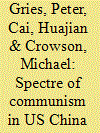

|
|
|
|
|
| Publication |
2010.
|
| Summary/Abstract |
Recent survey research suggests that, on average, Americans of all political stripes hold more positive attitudes towards the Chinese people than they do towards the Chinese government. This tendency appears more pronounced, however, among Republicans and conservatives, who are significantly more negative about the Chinese government than Democrats and liberals. 1
What best explains these two findings? In the wake of the January 2010 'Google Incident' and the Obama administration's announcement of continued arms sales to Taiwan, a February 1st People's Daily Online editorial declared that 'Cold War thinking' continues to bias Americans against China. American ideology, it argued, is imbued with a 'deeply-rooted hostility against and fear of … communism'. 2
|
|
|
|
|
|
|
|
|
|
|
|
|
|
|
|
| 9 |
ID:
174051
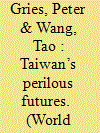

|
|
|
|
|
| Summary/Abstract |
The Taiwan Strait is heating up, as Mainland Chinese netizens, generals, and politicians increasingly talk about ‘forceful’ rather than ‘peaceful’ reunification. While Xi Jinping and Chinese nationalists desperately desire Taiwan’s reunification, Trump’s isolationist “America First” rhetoric has only encouraged reckless Chinese thinking about forcing reunification, and the Taiwanese remain largely passive, unable to confront an overwhelming threat. Wishful thinking in Beijing, Taipei, and Washington is increasing the odds of miscalculation. The 2020 presidential elections in Taiwan and the United States, and the ongoing U.S.-China trade war, furthermore, bode ill for peace in the Taiwan Strait.
|
|
|
|
|
|
|
|
|
|
|
|
|
|
|
|
|
|
|
|
|